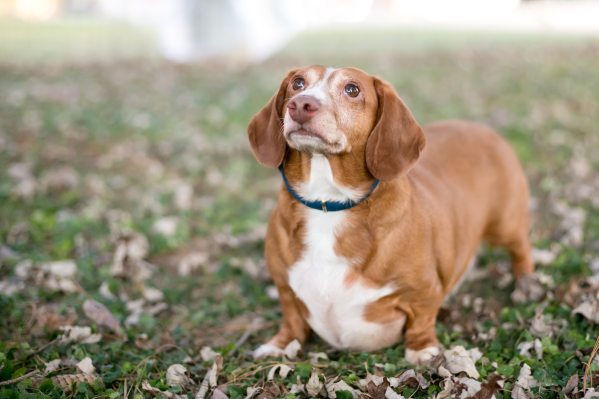One of the best ways to help keep your dog happy and healthy is to make sure they're at an appropriate weight. Dogs hold their weight differently than humans, however, so it can be tricky for us to tell whether or not a pup is a few pounds heavier than they should be.
The guidelines below can help you determine if your dog is overweight. If your pup has these telltale signs of weighing more than what’s healthy for them, there are plenty of ways to help your dog lose weight and get them back to being happy and healthy.
Signs your dog is overweight
A number on a scale isn’t enough to confirm whether or not your pup needs to lose a few pounds.
“Body weight alone can’t tell us whether a dog is overweight or not since we have to consider their muscle mass and fat as well,” explains Dr. Yui Shapard.
Just like with people, some dogs have a lot of muscle, which will make them weigh more than the average pup. In addition to weighing them to see if they’re 10-20% above their ideal weight, it’s also important to see if they have other signs that suggest they’re heavier than they should be.
Obese pups, for example, often have a sagging waist or a swinging tummy. Even if they don’t have a swinging tummy, a dog can still be overweight if they don’t have what vets call an abdominal tuck—the ascending abdominal line you see from the side of a dog starting from the chest and heading toward the lower stomach.
There are also some things to look out for on your pup if you’re looking at their back from above. Can you easily see your dog’s waist from that angle? A dog at their ideal weight will have their waist go in from their ribs, making it easily discernible from their chest. Overweight dogs can also have fat pads on the top of their hips, similar to “love handles” on humans, so keep an eye out for that as well.
Another way to check whether your pup should lose a few pounds is whether you can easily feel their ribcage when you run your hands over their sides. If you feel a layer of fat over their ribs when you do this, your dog is most likely overweight.
The World Small Animal Veterinary Association (WSAVA) has a body condition score sheet, which you can check out here, that provides images to help you figure out how under- or over-weight your dog may be. If your dog looks more like the pups on the right side of the chart, chances are good that your pooch weighs more than they should.
Overweight dogs are also often lethargic and can also pant more from minimal exercise. If your dog has trouble breathing while at rest, however, this is likely from something other than being overweight and you should make a vet appointment immediately.
What causes a dog to be overweight?
There are many reasons why your dog may be overweight, but by far the most common one is their eating habits, such as eating human food or a lot of treats.
Other things that can contribute to a pup’s weight gain are their level of activity as well as age, since dogs’ metabolisms gradually decrease as they get older.
“The same dog getting the same amount of the exact same diet may not be able to metabolize it the way they used to when they were young and active animals,” says Dr. Shapard.
While spaying or neutering your dog has significant health benefits, it can also contribute to pet obesity.
“We are essentially removing organs that produce hormones that are part of the intricate metabolic function of the body,” explains Dr. Shapard, “So naturally, this can lead to decrease in the body's ability to burn energy and fat.”
Another metabolic reason why your dog might weigh more is a condition called hypothyroidism, which is commonly seen in middle-aged dogs and can lead to weight gain.
”If you notice your dog is gaining weight despite no change in diet or lifestyle, it's worth having their thyroid level checked,” says Dr. Shapard.
Your veterinarian can work with you to determine why your dog may be overweight and come up with a plan to help them safely lose the excess fat and/or address the underlying issue. And of course, the experts here at Pawp can also provide guidance on your specific questions or concerns about your pup's weight and nutrition.
